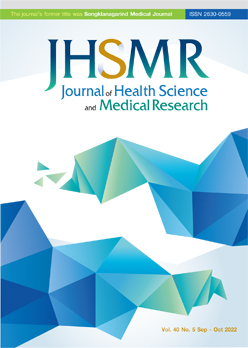Efficacy of a Modified Sepsis System on the Mortality Rate of Septic Shock Patients in the Emergency Department of Siriraj Hospital
DOI:
https://doi.org/10.31584/jhsmr.2022865Keywords:
antimicrobials, sepsis program modification, septic shockAbstract
Objective: To compare the 28-day mortality rate between pre- and post-implementation of a modified sepsis fast-track system.
Material and Methods: A cross-sectional cohort study was conducted at the Emergency Room (ER) of Siriraj Hospital, Bangkok. All patients who were diagnosed with septic shock and who received antimicrobial treatment at admission in the ER were included.
Results: In total, 420 patients were included in the study, split into 210 patients in the pre-protocol group and 210 patients in the post-protocol group. Comparing between pre- and post-modified sepsis fast-track system implementation, the patients who received antimicrobials within 1 hour numbered 140 (66.7%) and 175 (83.3%), respectively (OR 2.5, 95% CI 1.57–3.97, p-value<0.001). The 28-day mortality rates of the pre- and post-protocol groups were 44.8% vs. 34.8% (p-value=0.036). According to the multivariate analysis, the factors that were significantly related to 28-day mortality in patients with septic shock were age greater than 75 years, diabetes mellitus, and initial SOFA score >9.
Conclusion: Implementation of a modified sepsis program improved the time to first antimicrobial administration and decreased the 28-day mortality for patients with septic shock in the ER.
References
Singer M, Deutschman CS, Seymour CW, Shankar-Hari M, Annane D, Bauer M, et al. The third international consensus definitions for sepsis and septic shock (Sepsis-3). JAMA 2016; 315:801-10.
Rudd KE, Johnson SC AK, Shackelford KA, Tsoi D, Kievlan DR, et al. Global, regional, and national sepsis incidence and mortality, 1990-2017: analysis for the global burden of disease study. Lancet 2020;395:200-11.
Angkasekwinai N, Rattanaumpawan P, Thamlikitkul V. Epidemiology of sepsis in Siriraj Hospital 2007. J Med Assoc Thai 2009;92:S68-78.
Rivers E, Nguyen B, Havstad S, Ressler J, Muzzin A, Knoblich B, et al. Early goal-directed therapy collaborative group. Early goal-directed therapy in the treatment of severe sepsis and septic shock. N Engl J Med 2001;345:1368-77.
Ferrer R, Martin-Loeches I, Phillips G, Osborn TM, Townsend S, Dellinger RP, et al. Empiric antibiotic treatment reduces mortality in severe sepsis and septic shock from the first hour: results from a guideline-based performance improvement program. Crit Care Med 2014;42:1749-55.
Evans L, Rhodes A, Alhazzani W, Antonelli M, Coopersmith CM, French C, et al. Surviving sepsis campaign: international guidelines for management of sepsis and septic shock 2021. Intensive Care Med 2021;47:1181–247.
Kumar A, Roberts D, Wood KE, Light B, Parrillo JE, Sharma S, et al. Duration of hypotension before initiation of effective antimicrobial therapy is the critical determinant of survival in human septic shock. Crit Care Med 2006;34:1589-96.
Kumar A, Ellis P, Arabi Y, Roberts D, Light B, Parrillo JE, et al. Initiation of inappropriate antimicrobial therapy results in a fivefold reduction of survival in human septic shock. Chest 2009;136:1237-48.
Levy MM, Evans LE, Rhodes A. The surviving sepsis campaign bundle: 2018 update. Crit Care Med 2018;46:997-1000.
Gaieski DF, Pines JM, Band RA, Mikkelsen ME, Massone R, Furia FF, et al. Impact of time to antibiotics on survival in patients with severe sepsis or septic shock in whom early goaldirected therapy was initiated in the emergency department. Crit Care Med 2010;38:1-9.
Downloads
Published
How to Cite
Issue
Section
License

This work is licensed under a Creative Commons Attribution-NonCommercial-NoDerivatives 4.0 International License.
























